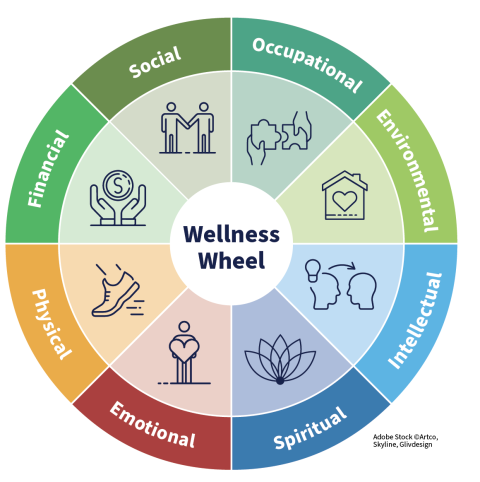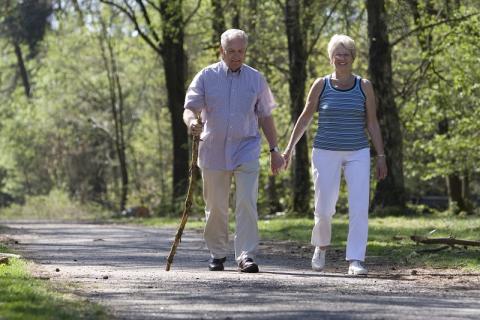Wellness is a wholistic, strength-based approach which builds on individual assets and strengths. It is individually defined based on goals, beliefs, values, culture, personality, and life experiences (Swarbrick, 1997).
Wellness is a continuous and active lifelong process of making individual decisions to live a healthy and fulfilling life. Well-Being is a state of ‘being’ that allows people to achieve their full potential (e.g., happiness, functioning, fulfillment, satisfaction).
To sum it up, wellness is the day-to-day pursuit of attaining a sense of well-being, such as physical movement, social connections, mental stimulation, meditation, sleep and nutrition. To put it simply, the difference can be seen as a process (wellness) versus result (well-being).
The Wellness Wheel describes the integration of 8 important dimensions of wellness: emotional, financial, environmental, intellectual, occupational, physical, social and spiritual. A wellness wheel assessment can help individuals identify core health values and goals.

A good way to start is by assessing your current level of well-being by taking the Wellness Wheel Assessment. The results will help guide you towards your own personal well-being action plan.
University of New Hampshire Cooperative Extension offers programs and resources to help you target and successfully achieve your individual well-being goals. Many are offered at no cost to you besides your time and interest. Check them out in "Moving Forward."
The Wellness Wheel is a strength-based model building on people's daily habits and routines while shaping new ones.
The Wellness Wheel focuses on 8 important dimensions of wellness: emotional, physical, financial, social, occupational, environmental, intellectual, and spiritual.
Although everyone's needs are unique, there are 8 dimensions of wellness that help us thrive and reach our personal health goals.
Watch this video to learn more about each of the 8 wellness dimensions.
One ingredient of self-care is understanding where you currently are in your wellness journey.
The Wellness Wheel can be used as a tool to check in and discover your overall wellness to better understand what is going well and what may be challenging in the moment. It can also help you assess choices or situations that impact your overall well-being.
Focusing on all 8 dimensions of wellness aims to improve overall quality of life and healthy habits through personal decision-making. The wellness wheel is a tool and visual representation that assesses an individual's perception of overall wellness. It is not a diagnostic tool.
Click the assessment button to get your personalized Wellness Assessment Report.
Now that you've identified areas of wellness you thrive in and those areas that may need greater attention through the Wellness Wheel Assessment, start developing an action plan with realistic steps you can take towards healthier habits and overall well-being.
The following Action Guide will take you through a series of reflection exercises and getting started ideas to create a personal step-by-step action plan.
Wellness Wheel Action Guide (Fillable and printable pdf)
Please take our quick anonymous survey. Your feedback on this assessment tool will help improve this online program. Thank you for participating!
Interested in taking charge of your health and well-being? Here is how UNH Extension can help.
Emotional Wellness
Emotional wellness is understanding our own feelings and expressing emotions in a constructive way. It is also the ability to manage stress and cope with life's challenges.

Adult Mental Health First Aid
Youth Mental Health First Aid
Farm Strong NH
Emotional Wellness Resources
NH Mental Health Resources by County
Mental Health Resources - Service Locations in NH
Farm Stress and Mental/Behavioral Health Resources
REAP Program - NH Residents 60 years and older and caregivers or family members of an older adult living in NH
Blog: Mental health and the brain are connected
Mental Flourishing Toolkit: Meditation and Breathing Exercises
Insight Timer App
Labyrinth Locator
Square Breathing
Blog: Seasonal Affective Disorder
Spiritual Wellness
Spiritual wellness is establishing and expanding our sense of purpose and meaning in life. It's taking the time to reflect on core values and beliefs.

Adult Mental Health First Aid
Youth Mental Health First Aid
A.I.D. - coming soon
Resources
The Gratitude Garden App: Cultivate Gratitude
Mindful Chair Yoga
Intellectual Wellness
Intellectual wellness is recognizing creative abilities and finding ways to expand knowledge and skills. Being open and curious to new experiences. In a nutshell...lifelong learning.

Coastal Research Volunteers
Lakes Lay Monitoring Program
Marine Docents
Master Gardeners
4-H Volunteer
Resources
10 Best Brain Games
Games for the Brain
Puzzle Link
Financial Wellness
Financial wellness is understanding our finances and being satisfied with current and future financial situations.

Farm Strong NH
Rehabilitation Farmer Funding Assistance
Personal Finance Assessment Tools
Spending, Saving and Retirement
Adjusting for Income Loss
Financial Security for All - Learning Lessons on a Variety of Topics and Finance Calculators
Web-Based Personal Finance Programs
Physical Wellness
Physical wellness is maintaining a healthy body by recognizing the need for physical activity, diet, nutrition and sleep.

Chronic Disease Self-Management
Chronic Pain Self-Management
Nutrition Connections
Trail Finder
Walk with Ease
Gentle Chair Exercises
Stronger Seniors Chair Exercises
Seated Tai Chi for Adults
Assistive Technology to Age in Place
Agriculture Resources
AgrAbility Brochure
AgrAbility - Enhancing quality of life for agriculture workers with disabilities
Arthritis
Assistive Technology
Back Health
Caregivers
Veterans and Beginning Farmers
Technical Disabilities Articles
Nutrition Resources
UNH Extension Recipes
Blog: Brain Healthy Foods for Older Adults
MIND Diet
Omega-3
MyPlate
Get Toasty with Healthy Toast
Sweeteners - Which are better?
Occupational Wellness
Occupational wellness is experiencing personal satisfaction and enrichment from one's work. It is also maintaining a healthy work / life balance.

4-H Volunteer
Master Wellness Volunteers
Walk with Ease
Agriculture Resources
AgrAbility Brochure
AgrAbility - Enhancing quality of life for agriculture workers with disabilities
Arthritis
Assistive Technology
Back Health
Caregivers
Veterans and Beginning Farmers
Technical Disabilities Articles
Environmental Wellness
Environmental wellness is surrounding ourselves in a pleasant, stimulating environment that supports well-being. It's taking care of both the global and personal environment through organizational skills and sustainable practices.

Coastal Research Volunteers
Lakes Lay Monitoring Program
Natural Resources Stewards
Nature Groupie
NH Big Trees
NH Coverts Project
NH Bio Blitz
Master Gardeners
Marine Docents
Social Wellness
Social wellness is developing a sense of connection, belonging and being part of supportive social networks. Relating and connecting to others by engaging in community.

Master Wellness Volunteers
Walk with Ease
4-H Volunteer
Blog: Effects of Prolonged Social Isolation
AARP: 8 Ways to Build Social Connections
Explore Programs
Get Involved
Health & Well-Being Newsletters - Subscribe to a variety of newsletters that interest you. Delivered directly to your inbox.
Getting Connected to Community - Get connected with over 15 opportunities to volunteer through UNH Extension programs.








